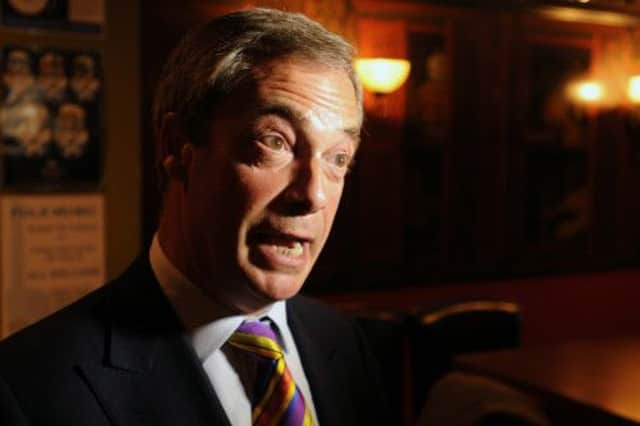Allan Massie: Farage between rock and a hard place


Nevertheless, this is how these parties are usually described by opponents if not by themselves; and today their opponents are worried, and have reason to be worried, because Ukip, the FN and the Dutch Freedom Party (PVV) are all riding high in the polls.
Ukip may not expect to win many seats at the 2015 general election; its hopes there are limited to doing great damage to David Cameron and the Conservatives. But next summer’s European election is a different matter. For some, it’s a glorified opinion poll; for many an opportunity to express their distaste for the mainstream parties.
Advertisement
Hide AdAdvertisement
Hide AdIt will be no surprise if Ukip gets more votes than the Conservatives in this election, perhaps more than Labour, too. Its chances of doing so have certainly been boosted by the decision of Yorkshire billionaire Paul Sykes to bankroll the Ukip campaign. In France, meanwhile, recent polls have put Marine Le Pen and the FN ahead of both the governing Socialists and what is left of the old Gaullist Party (the UMP), while Geert Wilders and the PVV head the polls in the Netherlands, too.
The three parties have some common aims: to assert the primacy of national interests rather than pan-European ones, even by breaking the European Union by resuming national independence, and, more immediately, to stop or at least crack down on immigration from non-European countries and from Bulgaria and Romania, whose citizens will be entitled to move anywhere in the EU from January.
It is not absolutely clear that Le Pen, by some way the most persuasive politician the European “far-right” has had in decades, wants France to leave the EU, but she does want it to scrap the euro and bring back the franc; doing this would effectively destroy the eurozone and stall any further progress towards an “ever-closer union”. She is hostile to the Brussels bureaucracy, and her position with regard to the EU bears some resemblance to that of General de Gaulle, who spoke of a Europe of the Nation States (L’Europe des Etats).
Wilders’ PVV began simply as an anti-immigrant party, and he himself came to prominence as a fierce critic of Islam, a religion he has described in abusive terms. The violence of his rhetoric caused the Labour government here to try to ban him from entering Britain – though any such ban would certainly have been illegal, especially as he was already an elected politician in an EU member state. Like many, he has learned to talk in more moderate language as he moved from the fringe to the centre of politics, but he remains anti-Islam and pro-Zionist.
The FN and the PVV have now agreed to collaborate and to form an anti-EU group in the next European Parliament. (It is one of the ironies of current political arrangements that anti-EU parties win seats far more easily in that parliament than in their own national legislatures.) They have invited Nigel Farage and Ukip to join them in this association. He has rejected the offer, ostensibly because the PVV and FN are racist and the FN is also anti-Semitic, while Ukip is neither.
Actually, Le Pen has led the FN away from the open racism and anti-Semitism of the party’s founder and long-time leader, her father Jean-Marie Le Pen. The FN now has a good many members of Arab origin (second or third generation French men and women) and some French Jews also. Nevertheless the FN has been for so long demonised in the British press that Farage may be wise to eschew any formal or close association with it. The fact that Le Pen has called Farage “immature” and “afraid” has, of course, nothing to do with his rejection of invitations to join this new FN-PVV alliance.
Le Pen has achieved something of which Farage at present can only dream. She has brought the FN into the mainstream of French politics. The electoral system still works against its representation in the National Assembly – and will continue to do so as long as voters from other parties combine against it in the second round of parliamentary elections. If France had a first-past-the post system like the British one, the FN would probably have at least as many members of parliament as the Liberal Democrats do here, and would have more if elections were decided on a pure PR system.
If Farage had taken the risk of accepting the invitation to align himself with the FN and PVV, he would have found himself subject to even more severe criticism than he currently receives. So it’s not surprising that he declined. Arguably, however, his caution or, if you prefer, timidity, may backfire on him. As Le Pen puts it: “The time when patriotic movements were divided, intimidated or even terrorised by demonising each other is over. International co-operation offers a type of recognition that could help overcome the disdain and antagonism of the press and political elites”. In other words, by coming together the so-called “far-right”, or in their own view, “patriotic” parties, would create a united front sufficiently formidable to alarm the Brussels bureaucracy and, at the very least, perhaps force reforms on it – one of these being a Europe-wide crackdown on immigration and a restriction of the “free movement of capital and labour” provided for in the 1956 Treaty of Rome, which laid the groundwork for what has become the European Union.
Advertisement
Hide AdAdvertisement
Hide AdIn response, Farage might say that he doesn’t want to reform the EU; he wants out of it. Yet opinion polls everywhere suggest it is reform that a majority of people want, rather than the break-up of the union or a unilateral walk-out. By rejecting these overtures, he may have reduced the chance of getting what would satisfy many of his supporters – though not, of course, those who would be satisfied by nothing less than leaving the EU.